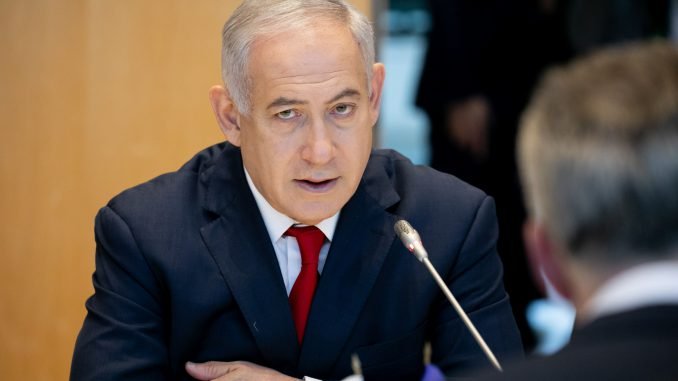
The prime minister told local Jews who gathered in Vilnius’ Choral Synagogue that his visit would strengthen the ties between the countries.
“With this independence, we now have new friendships and we have such a friendship with the democracy of Lithuania,” he said.
“Israel and Lithuania (are) two small democracies facing challenges but confident in our ability to seize the future and we can seize it better together. This visit made this more possible”.
Faina Kukliansky, chairwoman of the Jewish Community of Lithuania, said that around 300 people had gathered for the meeting with the Israeli leader.
Netanyahu thanked the Lithuanian government for the continuing fight against anti-Semitism and for “defending the truth”.
“We support you and encourage you to do more and more of this,” he said.
Lithuania has traditionally been one of Israel’s strongest diplomatic supporters in Europe, due in part to the Holocaust‘s legacy and Vilnius’ alignment with the US.
However, Lithuanian diplomats have lately had to balance between different EU and US opinions on Middle East issues. In solidarity with Europe, Vilnius does not follow in the US’ footsteps in recognizing Jerusalem as Israel’s capital and supports Iran’s nuclear deal, despite opposition from the US and Israel.
Lithuania criticizes Israel over the expansion of Jewish settlements in the occupied Palestinians territories, but it does so less sharply than some Western European countries.
The chairwoman of the Jewish Community told reporters that the EU should cooperate more actively with Israel.
“Of course, it is unfortunate that the opinions of the EU and Israel diverge on many issues. I do understand Lithuania, which is consistently following the EU agreements, policies and so on,” Kukliansky said.
“Israel is the most democratic country in the Middle East. So why not cooperate with Israel, which has such great scientific potential, such great human potential?” she added.
Tours the Vilnius Ghetto
Netanyahu told the Lithuanian Jews that he had spent Saturday touring the former Vilnius (Vilna) Ghetto in the capital’s Old Town.
Established in September 1941, the ghetto was closed on September 23-24, 1943.
Before World War II, Jews made up a third of the population of the Lithuanian capital, which was an important center of Jewish culture. Only 2,000 of Vilnius’ 57,000 Jews survived the war.
More than 90 percent of Lithuania’s total pre-war Jewish population of around 208,000 were killed by the Nazis, often assisted by their local collaborators.
“Yesterday my wife Sara and I walked through the streets of the Jewish ghetto of Vilna. We saw the Jewish homes. Sara said she could see the faces of the little Jewish children from 75 years ago. We saw the Jewish theatre. We could hear the music of the violins. We saw the ruins of some of the 100 Jewish synagogues,” Netanyahu said.
“And we saw the courtyards where Jews were assembled before being crated off to Ponar where they were shot by Lithuanian collaborators and the Nazis and then thrown into the death pits. We saw all this”, he said.
“I saw their pictures on the walls of the ghetto. I heard their stories. I wanted to tell them: We are here. We are back. We are alive”.
“What a distance we have travelled in 75 years from the death pits of Ponar to a rising power in the world”.
Netanyahu said that he was “a Litvak on both sides of his family”. His grandmother was born in Šeduva, a town in Lithuania, and his grandfather was born in Krėva, in what is now Belarus.
Around 3,000 Jews now live in Lithuania.
